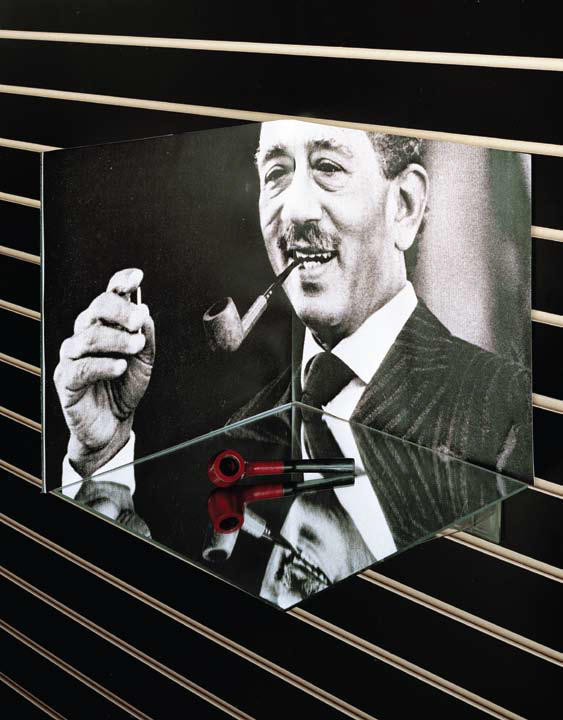
“All my life,” Anwar Sadat once wrote, “I’ve felt attracted to acting.” One of thirteen siblings born in a poor Delta town, he made the world his stage and gave a stirring performance: from underdog to president and war hero, Time magazine’s 1976 Person of the Year, and winner of the 1978 Nobel Peace Prize. Unfortunately, his ratings at home weren’t nearly as good as those he received abroad.
A collection of Sadat’s belongings, including several of his famous pipes, are on display in Cairo. You won’t find them in a presidential museum, but at a tourist trap called Dr Ragab’s Pharaonic Village. Typical black-stemmed, brown-bowled affairs, the pipes are arranged in a glass case with a pair of shoes and socks, a walking stick, and a half-finished canister of Nat Sherman’s Highstone tobacco.
The pipe, with its scholarly Anglo connotations, was a signature prop for the statesmanly persona Sadat had constructed with no small art; during the Camp David talks he was rarely seen without it. The pipe also appeared frequently in faux-candid snapshots of Sadat lounging around his villa gardens with his much younger, fair-skinned, half-British wife. An early master of the photo op, Sadat saw to it that emblematic moments in his private and official life were well documented and publicized. He was photographed praying, playing with his children, shaving in the presidential bathroom. In a favored pose, he held his pipe and gazed, as visionaries do, out into the distance.
Sadat was a natural. In the 1940s the young army lieutenant wore a monocle and tucked a swagger stick under his arm, imitating the German officers with whom he collaborated against Egypt’s hated British overlords. He later grew a beard and adopted a pious alias, Hajj Mohammed, the better to elude the British, who managed nevertheless to jail him several times.
The pipe, Sadat’s most successful bit of stagecraft, conveyed his canny paternal wisdom while delivering a subtle “fuck you” to the Brits, whom he’d beaten at their own game. Symbolically, at least, the pipe was loaded. But if the persistent rumors that circulated Cairo are to be believed, Highstone was not the only thing he was smoking.
Popular opinion maintained that the president was a hashesh: a devout smoker of hashish. Hashish was certainly affordable and widely available throughout Sadat’s term in office. In the Old City it was sold openly, alongside fruits and vegetables. Low-level dealers were sometimes apprehended, but the big fish swam free. In a country rife with informers, where the only working telephones were the ones that had been tapped, people reasoned that the boss must have known what was going on.
The president’s conduct, moreover, bore the whimsical traits of the hashesh. He was a self-absorbed dreamer whose favorite pastime was watching video clips of past triumphs and NASA footage of the first lunar landing. He admired America for its pioneer spirit and “Wild West” expansion and envisaged a day when Egyptians would open a new frontier by greening and colonizing the desert. A munificent host, Sadat thought nothing of giving priceless antiquities to fellow heads of state. He was inconsistent — alternately vicious and tender toward his public — but this enabled him to project an image by turns virile and austere, urbane and rustic, spiritual and ruthless.
Well before the end of what is now known as the Sadat era, Egyptians had wearied of the president’s theatricalities and the vainglorious tyrant they thinly disguised. His last, most indelicate prop was a field marshal’s baton resembling a royal scepter. It had a Pharaonic lotus finial, and he held it across his chest in a pose most often seen on temple friezes and, alas, sarcophagi.
On the morning of October 6, 1981, dressing for his annual Victory Day parade, Sadat forgot his scepter — a bad omen — and chose not to wear his bulletproof vest because it made him look bulky. But he would have died that day, anyway; his assassins fired at close range.
“I have killed Pharaoh, and I am not afraid,” one of them reportedly said.
Whether or not Sadat’s pipe ever emitted the nutty fragrance of Bekaa Valley Gold, within twenty-four hours of the assassination a tank rumbled into the medieval square where the goods had been sold. Cairo’s hash market, like the man who lent his name and flourish to an era, was history.